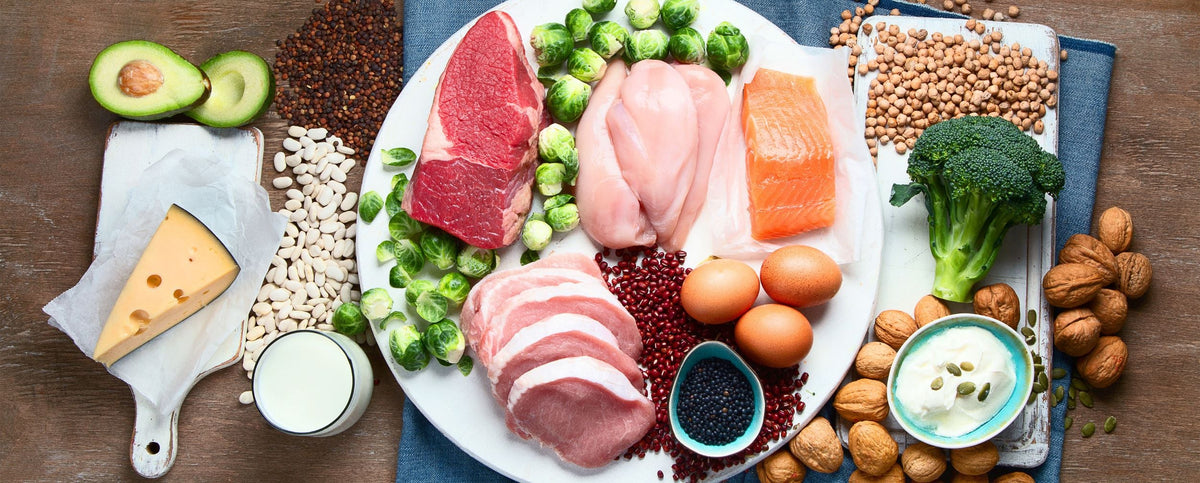
Discover the 7 Essential Nutrients for Brain and Body Health
|
|
Time to read 4 min
|
|
Time to read 4 min
Every day brings new challenges, so you need to be ready to take them on with the right fuel for both your brain and body. A healthy, balanced diet with the right nutrients does more than just energize you — it helps foster mental health and brain development while potentially lowering the risk of cognitive decline.
Each nutrient in your system works together to keep you alert, energized, and focused, and are a must for busy parents trying to keep the house in order and kids focused for the new school year. Let's look at the essential nutrients your body and brain need to keep working at their best.
These nutrients play a crucial role in supporting your body’s metabolic functions, particularly in the brain and nervous system. They play crucial roles in energy production, molecule transportation, neurotransmitter synthesis, the formation of RNA and DNA, and in maintaining healthy skin. A deficiency in B vitamins can possibly lead to cognitive impairment, whereas healthy levels help protect against its decline, especially in older adults.
B vitamins are common in animal proteins and dairy products. They’re also found in leafy green vegetables, beans, and fortified foods like cereals and nutritional yeast.
Both vitamins have potent antioxidant and anti-inflammatory properties that help keep your brain healthy. Vitamin C neutralizes free radicals, supporting neurotransmitter synthesis and promoting healthy blood vessel functions, both of which support cognitive performance and mood regulation. Vitamin E is crucial for protecting cell membranes so your nerves can communicate efficiently, which is a key part of healthy brain function. Together, these vitamins help reduce oxidative stress, a key factor in neuronal damage and brain degeneration.
Vegetable oil is high in vitamin E, but it’s best to choose cold-pressed or unrefined oils to make sure the oil has undergone minimal processing and retains its health benefits. Incorporating whole foods like sunflower seeds, hazelnuts, almonds, and avocados is another way to get Vitamin E. Vitamin C can be found in citrus fruits, tomatoes, potatoes, red and green peppers, kiwis, broccoli, and strawberries.
Fat is usually perceived as something to avoid, but there are healthy fats that can benefit every diet. Omega-3 fatty acids, for example, are essential for eye and brain health and help enhance learning and memory. Some studies show that they can aid in lowering the risk of cardiovascular disease and Alzheimer’s disease.
Omega-3 fatty acids are found in fish such as salmon, mackerel, tuna, herring, and sardines. You can also get them from nuts and seeds such as flaxseed, chia seeds, walnuts. Fortified foods like eggs, yogurt, milk, soy beverages, leafy green vegetables, and beans are also a great source.
Iron is crucial for muscle metabolism, growth, and nervous system development. It also helps your body create dopamine, norepinephrine, and serotonin. Iron deficiency can negatively affect your memory and learning capabilities, so it’s important to make sure you’re getting enough in your diet.
The richest sources of iron are lean red meats such as beef and liver. You can also find iron in chicken, turkey, seafood, nuts, seeds, and beans.
Zinc is vital for brain development because it plays a crucial role in helping your nerves communicate, which is fundamental for learning and memory. It also supports your immune system by enhancing your body’s ability to fight off harmful bacteria and viruses.
Red meat is a great source, but other types of meat such as chicken or fish also have zinc. Legumes, nuts, and seeds are other nutritious sources of zinc.
A high-fiber diet not only aids digestion and weight management but also reduces systemic inflammation, a contributor to cognitive decline. Fiber also helps stabilize blood sugar levels and provides vital nutrients that protect brain cells from oxidative stress.
High-fiber foods include whole fruits, vegetables, beans, lentils, and whole-grain foods such as whole-grain bread, barley, oats, quinoa, bran, nuts, and seeds.
Carbohydrates break down into glucose, the primary energy source for our body. Sugars, starches, and fiber are all different types of carbs that are important for cognitive health because they help fuel brain function, influence your mood, and support learning and memory. It’s best to get your carbohydrates from whole grains, dairy, fruits, and vegetables instead of processed foods.
Why is protein such an important part of our diets? It's crucial for maintaining a lean body mass by promoting satiety and enhancing your metabolic rate. A lesser-known fact about protein is that it plays a role in mental acuity because it supports brain functions, enhances cognitive performance, and provides essential amino acids that make important chemical messengers in your brain.
You can find protein in from animal sources such as chicken, beef, turkey, seafood, eggs, and some dairy products like milk and Greek yogurt. If you don’t eat meat or dairy, there are still plenty of high-protein vegetarian and vegan options. Look for plant-based proteins like lentils, chickpeas, beans, nuts, and seeds.
Water makes up more than two-thirds of our bodyweight. Every cell and organ needs water to function properly. It acts as a lubricant for our joints, regulates body temperature through sweating, helps prevent constipation, supports proper blood circulation, and helps regulate body temperature. Water also plays an important role in creating dopamine and serotonin, which are important for mood and brain function.
It's recommended that men drink about 3,000 ml and women drink about 2,200 ml of water every day to stay hydrated.
By incorporating these nutrients into your diet, you’re setting yourself up for success by giving your body everything it needs to function at its best.






